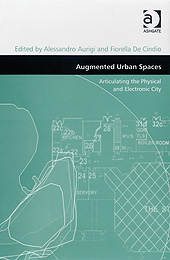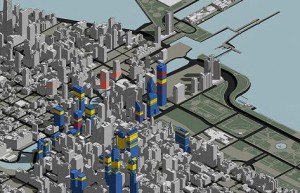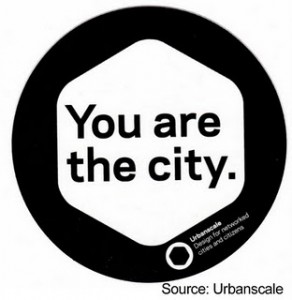 The Mobile City Web portal and the blog of Martijn de Waal are inspirational to me. He introduces many concepts that, although they do not use precisely the same words/vocabulary, they mirror what I've been thinking and seeing. One of the posts on The Mobile City from March 2011 is a review by guest contributor Michiel de Lange of a compendium of articles about technology in cities edited by Alessandro Aurigi and Fiorella De Cindio.
The Mobile City Web portal and the blog of Martijn de Waal are inspirational to me. He introduces many concepts that, although they do not use precisely the same words/vocabulary, they mirror what I've been thinking and seeing. One of the posts on The Mobile City from March 2011 is a review by guest contributor Michiel de Lange of a compendium of articles about technology in cities edited by Alessandro Aurigi and Fiorella De Cindio.
The Augmented Urban Spaces (2008) would be the basis for a great conference on "smarter cities" and Internet of Things.
Another post that I found stiulting is Martijn's report of the Cognitive Cities Salon he attended in Amsterdam, Martijn highlighted a talk given by Edwin Gardner entitled "The Algorithmic City" which I am sorry to have missed and, unfortunately, I have not found the slides on-line (yet). From what Martijn writes, the subject of Algorithmic Cities is currently theoretical but one can imagine a day when it will become common place.
The Algorithmic City is the result of urban planners using algorithms as part of their process(es). Quoting from the Mobile City blog post published on July 3 2011:
"So far algorhithms have shown up in ‘parametric design’ where all kinds of parameters can be tweeked that the computer will then turn into a design for a building or even a complete city. Gardner is not so much interested in this approach. The problem is that there is no relation between the paramaters, the shapes generated and the society that is going to make use of these shapes. Social or economic data are hardly used as parameters and the result is ‘a fetishism of easthetics’, at best beautiful to look at, but completely meaningless.
Instead, Gardner takes inspiration from Christophers Alexander‘s book A Pattern Lanugage."
I'm not sure if there is a connection between the theoretical work of Gardner and a video of the next version of a software solution provided by Procedural (a startup based in Zurich purchased by ESRI on July 11, 2011), called CityEngine but somehow the two come together in my mind. Using CityEngine, design algorithms are manipulated using the simplest of gestures, such as dragging. It's not a software platform I'm likely to have need for in the near future, but I hope that urban planners will soon have opportunities to experiment with it, to explore the Algorithmic City concept, and that I will witness the results. Maybe someone will build an AR experience to "see" the Algorithmic City using smartphones.



